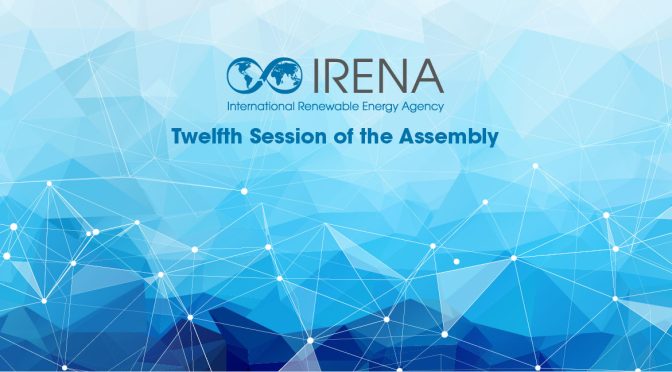The Twelfth Session of the International Renewable Energy Agency’s (IRENA) Assembly will take place virtually on the 15th and 16th of January, in Abu Dhabi, United Arab Emirates. The Assembly represents the first high-level meeting of the global energy and environment community of the year and will serve as a follow up to the energy transition commitments made, and the momentum, generated in 2021.
The meeting will bring together virtually more than 1,100 delegates from 137 countries including Heads of State, Ministers, Heads of International Organisations and CEOs, and take place under the theme ‘Energy Transition: From Commitment to Action’ – reflecting the growing need to translate bold ambition into concrete steps that accelerate the shift to a cleaner, fairer and more resilient energy system.
“With every passing year the gravity of the challenge ahead of us strengthens,” said Francesco La Camera. “As we meet for this Assembly, we do so clear in the knowledge that 2021 established new benchmarks in ambition, commitment and renewable energy deployment globally. That momentum must serve as fuel as we head into the new year.”
Ms Alexandra Hill Tinoco, Minister of Foreign Affairs of El Salvador, will be President of the Assembly. Recent analysis from IRENA shows that El Salvador has built no new fossil fuel-based power since 2013 and made significant progress in diversifying its power generation base. Since 2015, solar PV capacity has grown 10-fold in the country and a national master plan eyes 682 MW of new renewable generation capacity by 2026.
“As a global actor in the fight against climate change and a leader in renewable energy deployment, El Salvador is honored to be presiding IRENA’s Assembly in 2022,” said Foreign Minister Alexandra Hill Tinoco. “We plan to work with our regional partners and the IRENA membership at large to intensify the momentum towards climate action. While the challenges are substantial, the need to confront them is of unprecedented urgency. Our meeting this year is an opportunity to tangibly contribute to our common goals. Renewable energy uptake has to be an intrinsic part of our action agenda. It is essential to the future of our planet.”
According to IRENA’s World Energy Transitions Outlook report, successfully decarbonising the global energy system by 2050 in line with the achievement of the 1.5°C goal, requires steep and rapid declines in energy related emissions this decade. By 2030, total global renewable energy capacity should reach 10 700 GW – close to four-fold increase on current capacity. Last year, the world installed a record 260 gigawatts of renewables, close to 50 per cent more than the previous record.
A published report just head of the Assembly entitled ‘Nationally Determined Contributions (NDCs) and Renewable Energy Targets in 2021’ highlights that only 144 NDCs out of the 182 submitted include quantified renewable energy targets and only 30 explicitly mention heating, cooling or transport. If implemented, current targets, including ambitious net zero announcements and planned methane emission reductions, would only limit global warming to 1.8?C by 2050 the report notes. Updated NDCs must better reflect renewable energy potential and climate goals.
“The fact that three quarters of the global emissions are now covered by net zero ambitions demonstrates the extent to which Glasgow realigned the world’s perspectives on what is possible and narrowed the gap with what is necessary,” continued La Camera. “But we are still far from moving quickly enough. The real hard work starts now in mobilising investment and shaping policy environments to stimulate a faster and more geographically balanced energy transition.”
The global event, taking place at the start of Abu Dhabi Sustainability Week (ADSW), will feature a high-level follow up on COP26, and the launch of two key IRENA reports on Africa and the geopolitics of hydrogen. Deliberations will also touch on the role of youth in the energy transition, and feature perspectives on the energy transition from parliamentarians and the private sector.
See more information and follow the livestream of the Assembly.


